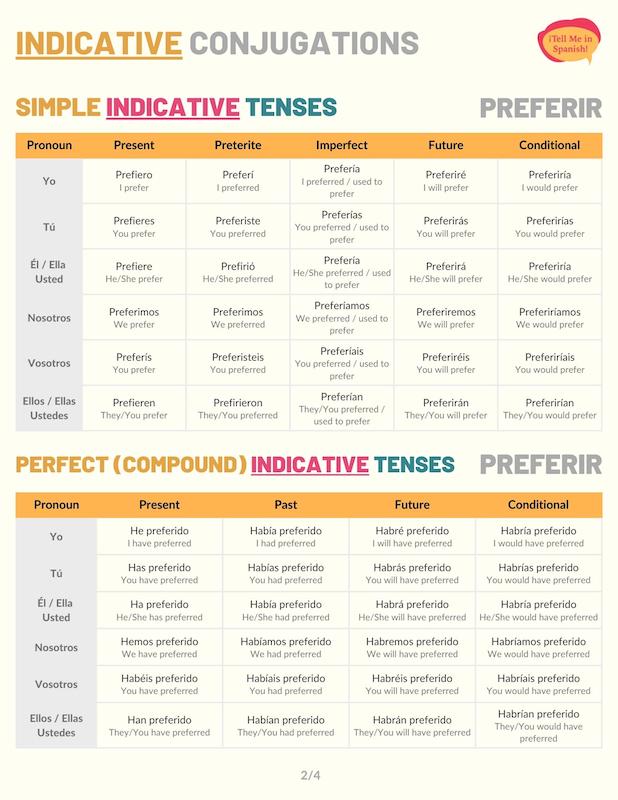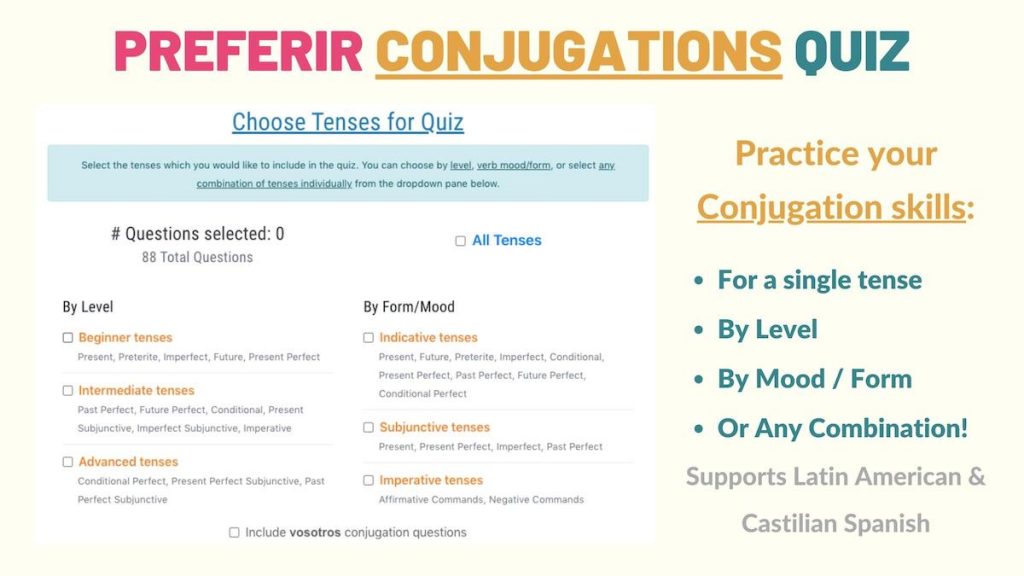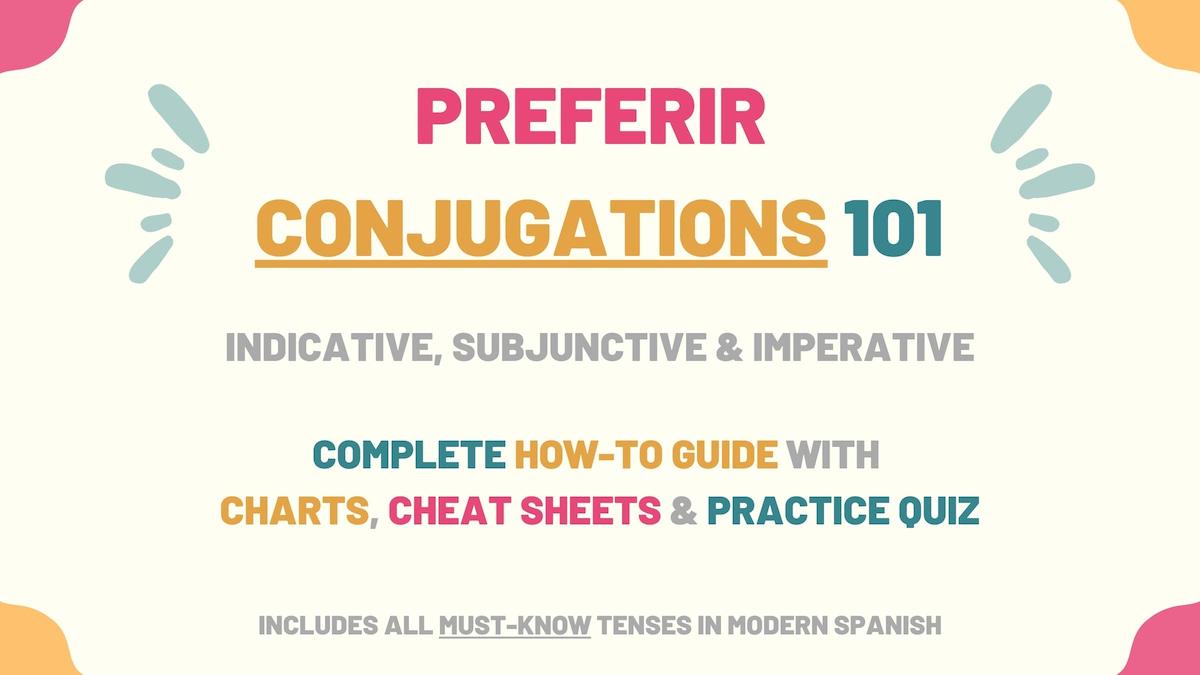Preferir conjugation patterns can help you practice -IR verbs with E to IE changes. Since these are common conjugation models, in this guide, we’ll learn how to conjugate preferir in Spanish. Here is a summary of what we’ll cover:
- Preferir Overview
- Indicative Tenses of Preferir Conjugations
- Subjunctive Tenses of Preferir Conjugations
- Imperative (Commands) of Preferir Conjugations
- Uses & Examples
- Download Preferir Conjugation Tables & Uses Cheat sheets
- Preferir Conjugation Practice Quiz
Overview of Preferir
| Verb Characteristic | Property |
|---|---|
| Verb Type | -IR |
| Irregular | No |
| Infinitive | Preferir |
| Gerund (Present Participle) Form | Prefiriendo |
| Past Participle Form | Preferido |
| Synonyms | Querer, elegir, favorecer. |
Stem Changes: E to IE and E to I
- Present Indicative: prefier for all subject pronouns except ‘nosotros’ and ‘vosotros’.
- Preterite: prefir for the third person singular and plural.
- Present Subjunctive: prefier for all subject pronouns except ‘nosotros’ and ‘vosotros’.
- Imperfect Subjunctive: prefirie for all subject pronouns.
Indicative Conjugations of Preferir
Present tense
Preferir present tense conjugation has an E to IE stem change for all pronouns except ‘nosotros’ and ‘vosotros’. See these changes in the conjugation chart below. These preferir conjugations allow you to talk about a person’s preferences. For example: Prefiero quedarme a descansar.
| Person | Conjugation | Translation |
|---|---|---|
| Yo | Prefiero | I prefer |
| Tú | Prefieres | You prefer |
| Él / Ella Usted | Prefiere | He/She prefers You (formal) prefer |
| Nosotros | Preferimos | We prefer |
| Vosotros | Preferís | You prefer |
| Ellos / Ellas Ustedes | Prefieren | They prefer You (plural) prefer |
Preterite tense
The preferir conjugation in the preterite tense has an E to I stem change only for the third-person singular and plural. Use these conjugations of preferir to refer to someone’s past preferences. For instance: Mis papás prefirieron comer pizza.
| Person | Conjugation | Translation |
|---|---|---|
| Yo | Preferí | I preferred |
| Tú | Preferiste | You preferred |
| Él / Ella Usted | Prefirió | He/She preferred You (formal) preferred |
| Nosotros | Preferimos | We preferred |
| Vosotros | Preferisteis | You preferred |
| Ellos / Ellas Ustedes | Prefirieron | They preferred You (plural) preferred |
Imperfect tense
In the past imperfect tense, preferir is used to talk about what people used to prefer for a long period in the past. Here is an example: De niña, yo prefería quedarme con mi mamá.
| Person | Conjugation | Translation |
|---|---|---|
| Yo | Prefería | I preferred I used to prefer |
| Tú | Preferías | You preferred You used to prefer |
| Él / Ella Usted | Prefería | He/She preferred He/She used to prefer You (formal) You (formal) used to prefer |
| Nosotros | Preferíamos | We preferred We used to prefer |
| Vosotros | Preferíais | You preferred You used to prefer |
| Ellos / Ellas Ustedes | Preferían | They preferred They used to prefer You (plural) preferred You (plural) used to prefer |
Near future
Ir (present tense) + a + preferir is how we form the near future in Spanish. Use these conjugations to say that people will prefer to do something soon in the future. For example: ¿Vas a preferir quedarte que ir a la fiesta?
| Person | Conjugation | Translation |
|---|---|---|
| Yo | Voy a preferir | I’m going to prefer |
| Tú | Vas a preferir | You’re going to prefer |
| Él / Ella Usted | Va a preferir | He/She is going to prefer You (formal) are going to prefer |
| Nosotros | Vamos a preferir | We’re going to prefer |
| Vosotros | Vais a preferir | You’re going to prefer |
| Ellos / Ellas Ustedes | Van a preferir | They’re going to prefer You (plural) are going to prefer |
Future simple tense
Conjugate preferir to the future tense to explain that someone will prefer something in the future. For instance: Estoy segura que Luna preferirá la ensalada.
| Person | Conjugation | Translation |
|---|---|---|
| Yo | Preferiré | I will prefer |
| Tú | Preferirás | You will prefer |
| Él / Ella Usted | Preferirá | He/She will prefer You (formal) will prefer |
| Nosotros | Preferiremos | We will prefer |
| Vosotros | Preferiréis | You (formal) will prefer |
| Ellos / Ellas Ustedes | Preferirán | They will prefer You (plural) will prefer |
Conditional tense
As shown in the preferir conjugation chart below, this verb has no stem changes when conjugated to the conditional tense. We use these forms to explain or ask if someone would prefer something. For instance: ¿Preferirían que no les dijera nada?
| Person | Conjugation | Translation |
|---|---|---|
| Yo | Preferiría | I would prefer |
| Tú | Preferirías | You would prefer |
| Él / Ella Usted | Preferiría | He/She would prefer You (formal) would prefer |
| Nosotros | Preferiríamos | We would prefer |
| Vosotros | Preferiríais | You would prefer |
| Ellos / Ellas Ustedes | Preferirían | They would prefer You (plural) would prefer |
Present perfect tense
To conjugate to the present perfect indicative tense, use present forms of haber + preferido. When using these preferir conjugations, you’re explaining that someone has or hasn’t preferred something. For instance: Siempre hemos preferido dormir en casa.
| Person | Conjugation | Translation |
|---|---|---|
| Yo | He preferido | I have preferred |
| Tú | Has preferido | You have preferred |
| Él / Ella Usted | Ha preferido | He/She has preferred You (formal) have preferred |
| Nosotros | Hemos preferido | We have preferred |
| Vosotros | Habéis preferido | You have preferred |
| Ellos / Ellas Ustedes | Han preferido | They have preferred You (plural) have preferred |
Take Note: Preferido can also work as a past participle adjective. In this context, this word is combined with the verb ser, and it means ‘favorite’. Es mi comida preferida.
Past perfect
Preferir in the past perfect tense communicates that someone had or hadn’t preferred something before another reference point. For example: Hasta ayer, yo siempre había preferido quedarme en casa.
To form the past perfect tense in Spanish, use haber’s imperfect forms + preferido
| Person | Conjugation | Translation |
|---|---|---|
| Yo | Había preferido | I had preferred |
| Tú | Habías preferido | You had preferred |
| Él / Ella Usted | Había preferido | He/She had preferred You (formal) had preferred |
| Nosotros | Habíamos preferido | We had preferred |
| Vosotros | Habíais preferido | You had preferred |
| Ellos / Ellas Ustedes | Habían preferido | They had preferred You (plural) had preferred |
Future perfect
The future perfect in Spanish expresses that someone will have preferred something. For example: ¿Por qué habrán preferido la ensalada?
| Person | Conjugation | Translation |
|---|---|---|
| Yo | Habré preferido | I will have preferred |
| Tú | Habrás preferido | You will have preferred |
| Él / Ella Usted | Habrá preferido | He/She will have preferred You (formal) will have preferred |
| Nosotros | Habremos preferido | We will have preferred |
| Vosotros | Habréis preferido | You will have preferred |
| Ellos / Ellas Ustedes | Habrán preferido | They will have preferred You (plural) will have preferred |
Conditional perfect
In Spanish, the conditional perfect tense of preferir is used to say someone would have preferred something. For instance: Habría preferido que me dijeras.
| Person | Conjugation | Translation |
|---|---|---|
| Yo | Habría preferido | I would have preferred |
| Tú | Habrías preferido | You would have preferred |
| Él / Ella Usted | Habría preferido | He/She would have preferred You (formal) would have preferred |
| Nosotros | Habríamos preferido | We would have preferred |
| Vosotros | Habríais preferido | You would have preferred |
| Ellos / Ellas Ustedes | Habrían preferido | They would have preferred You (plural) would have preferred |
Progressive tenses
The progressive tenses express that someone is doing something at the moment of speaking. However, when it comes to the verb preferir, we must use the present tense to talk about what someone currently prefers.
Preferir Subjunctive Conjugations
The subjunctive mood in Spanish allows people to discuss wishes, requests, advice, expectations, or doubts. They also talk about hypothetical situations. The conjugation charts below teach us how to conjugate preferir to the subjunctive tenses we use in modern Spanish.
Present subjunctive
Preferir subjunctive conjugation has an E to IE change for all subjects except ‘nosotros’ and ‘vosotros’. Instead, these two subject pronouns have an E to I change. We use these forms to wish or suggest that someone prefers something.
For example: Espero que mis amigos prefieran no ir.
| Person | Conjugation | Translation |
|---|---|---|
| Yo | Prefiera | I prefer |
| Tú | Prefieras | You prefer |
| Él / Ella Usted | Prefiera | He/She prefers You (formal) prefer |
| Nosotros | Prefiramos | We prefer |
| Vosotros | Prefiráis | You prefer |
| Ellos / Ellas Ustedes | Prefieran | They prefer You (plural) prefer |
Present perfect subjunctive
Use the present subjunctive of haber + preferido to conjugate the present perfect subjunctive of this verb. With these forms, preferir conveys uncertainty or expectations about what a person has already preferred. Espero que hayas preferido decir la verdad.
| Person | Conjugation | Translation |
|---|---|---|
| Yo | Haya preferido | I have preferred |
| Tú | Hayas preferido | You have preferred |
| Él / Ella Usted | Haya preferido | He/She has preferred You (formal) have preferred |
| Nosotros | Hayamos preferido | We have preferred |
| Vosotros | Hayáis preferido | You have preferred |
| Ellos / Ellas Ustedes | Hayan preferido | They have preferred You (plural) have preferred |
Imperfect subjunctive
Conjugate preferir to the imperfect subjunctive to talk about past suggestions, requests, and wishes someone had about a person’s preferences. For example: Me encantaría que prefirieras venir conmigo.
Depending on the type of Spanish (Castilian vs Latin American) you use, the imperfect subjunctive tense has two conjugation models:
Latin American Spanish version
| Person | Conjugation | Translation |
|---|---|---|
| Yo | Prefiriera | I preferred |
| Tú | Prefirieras | You preferred |
| Él / Ella Usted | Prefiriera | He/She preferred You (formal) preferred |
| Nosotros | Prefiriéramos | We preferred |
| Ellos / Ellas Ustedes | Prefirieran | They preferred You (plural) preferred |
Note: Vosotros is not used in Latin American Spanish. Therefore, this pronoun and its conjugation have been excluded from the preferir conjugation chart above.
Castilian Spanish version
| Person | Conjugation | Translation |
|---|---|---|
| Yo | Prefiriese | I preferred |
| Tú | Prefirieses | You preferred |
| Él / Ella Usted | Prefiriese | He/She preferred You (formal) preferred |
| Nosotros | Prefiriésemos | We preferred |
| Vosotros | Prefirieseis | You preferred |
| Ellos / Ellas Ustedes | Prefiriesen | They preferred You (plural) preferred |
Past perfect subjunctive
Prefirir conjugated to the past perfect subjunctive allows you to say that someone would have preferred something if a past condition was met. This tense can also express regret for having preferred something.
For example: Creéme, hubiera preferido estar contigo.
| Person | Conjugation | Translation |
|---|---|---|
| Yo | Hubiera preferido | I had preferred |
| Tú | Hubieras preferido | You had preferred |
| Él / Ella Usted | Hubiera preferido | He/She had preferred You (formal) had preferred |
| Nosotros | Hubiéramos preferido | We had preferred |
| Vosotros | Hubierais preferido | You had preferred |
| Ellos / Ellas Ustedes | Hubieran preferido | They had preferred You (plural) had preferred |
Preferir Imperative Conjugations
The Spanish imperative mood is used to order people to do or not do something. Because we cannot command people to prefer something, these preferir conjugations are rarely used in Spanish. Therefore, they’ve been omitted from this guide. However, you can discover how to form the imperative conjugations of preferir if you absolutely need them.
Meanings of Preferir & Examples
Now that you have learned how to conjugate preferir, it’s time for us to check how to use this verb correctly. Similar to English, in Spanish, this verb is used to talk about preferences.
Use determiners and nouns to refer to things or objects people prefer. Or, use an infinitive verb if you’re talking about activities. Check these examples:
La verdad, preferimos no ir.
To be honest, we prefer not to go.
Sabía que preferirías la blusa morada.
I knew you would prefer the purple blouse.
Mis papás preferían que nosotros estudiáramos.
My parents used to prefer that we studied.
Download Preferir Conjugation Charts & Uses Cheat sheet

Preferir is an important and very common Spanish -IR verb in daily conversations. It also has stem changes in numerous tenses. You can download a copy of the cheat sheet PDF which contains all the preferir conjugation charts as well as examples of how to use this verb in your conversations.
Practice Quiz: Preferir Conjugation

Congratulations, you can now conjugate the verb preferir in Spanish. The next step is to take the preferir conjugation practice quiz to test your skills and practice this stem-changing IR verb.



